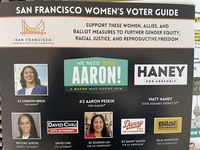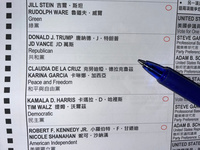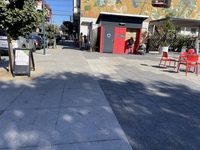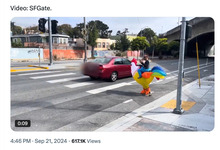 |
| Angelika/Mike Schilli |
|
Angelika San Francisco has an interesting voting system, namely the so-called "Ranked Choice Voting". Roughly and simply put, the voter ranks all the candidates in order of preference. The candidate they like the most is placed first, the second choice in second place, and so on. This initially sounds simple, but it has its pitfalls, as I will explain in more detail shortly. Such an election process prevents run-off elections, but it is often criticized as being too complicated or opaque.
But how exactly does it work in San Francisco? The voter can rank up to 10 candidates in order of preference. In our mayoral election this year, there are 13 candidates running. However, the ranking stops at 10. Each eligible voter can rank as many (up to 10) or as few candidates as they wish. Each candidate must have a different ranking on the ballot, and the same candidate can only receive one ranking.
How is the counting done? First, it is counted how many times each individual candidate has landed in first place among the voters. If a candidate achieves the majority in this round (i.e., more than 50%), that candidate wins. The counting is then finished. If there is no winner after this first round of counting, the candidate with the fewest votes is eliminated. If a voter had indicated this candidate as their first choice, their second preference is then counted as their new first choice.
If a candidate receives more than 50% in the second round, that candidate wins and the counting is also concluded. If there is no winner again in the second round, the candidate with the fewest votes is eliminated once more, and the rankings are adjusted accordingly. This process continues until a winner is determined.
In theory, that sounds logical, but the counting method relies on the voter actually providing a complete ranking ladder. If a voter, for example, only chooses one candidate who is eliminated in the first round, the vote is lost. This can potentially lead to a candidate winning who was not generally favored and who wins with less than 50% of the votes, due to the previously explained principle of exhausted ballots. For example, if 200 ballots were cast and 80 of them are exhausted due to a lack of rankings for the remaining candidates, a candidate could win with 61 votes. That is more than 50% of the remaining 120 ballots, but 30.5% of all originally cast ballots.
Who is now entering the race for San Francisco? Out of the list of 13, only 5 are really to be taken seriously. First, there's our current mayor, London Breed, who wants to try again. Then there's Mark Farrell, who served on the city council from 2010 to 2018 and acted as interim mayor for half a year in 2018 after the death of the then-incumbent mayor, Ed Lee. Additionally, there's Ahsha Safaí, also a supervisor on the city council. Then there's Aaron Peskin, who has shaped city politics on the council for decades and currently serves as its chair. He has the nickname "Napoleon of North Beach," after the name of the neighborhood where he lives. He presents himself as particularly left-liberal but only has his own interests in mind. For example, he claims to support the creation of housing in San Francisco but consistently blocks construction projects in his district. He also campaigned on the need for political change in San Francisco, even though he has been part of the system for over 20 years as an influential supervisor on the city council. As a voter, you can't help but feel a bit taken for a ride. Unfortunately, we still see his campaign posters hanging in many windows.
And then there is the political outsider Daniel Lurie, who has not held any political office to date, but is connected to a very well-known San Francisco family, namely that of Levi Strauss. I'm sure you all know who Levi Strauss is. The man delighted the world with the legendary Levi's jeans. Daniel Lurie has pumped several million of his own fortune into the election campaign, and it seems to be paying off, as he is now mixing it up at the forefront. We've been receiving brochures from Lurie in our mailbox almost every day.
For the mayoral election in San Francisco, we expect that the winner will not be determined after the first round, but rather that the votes will be mainly distributed among Breed, Farrell, Lurie, and Peskin. It remains exciting on all levels.















